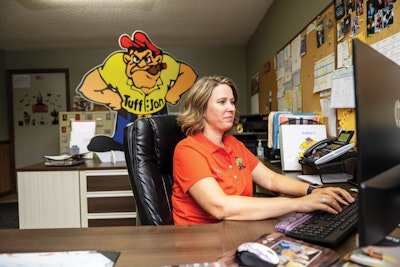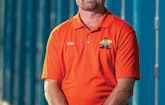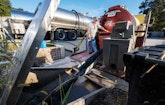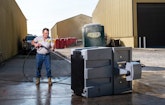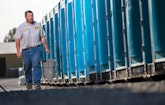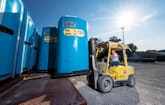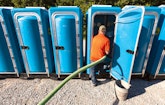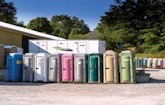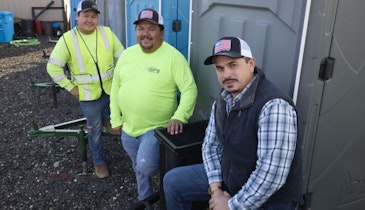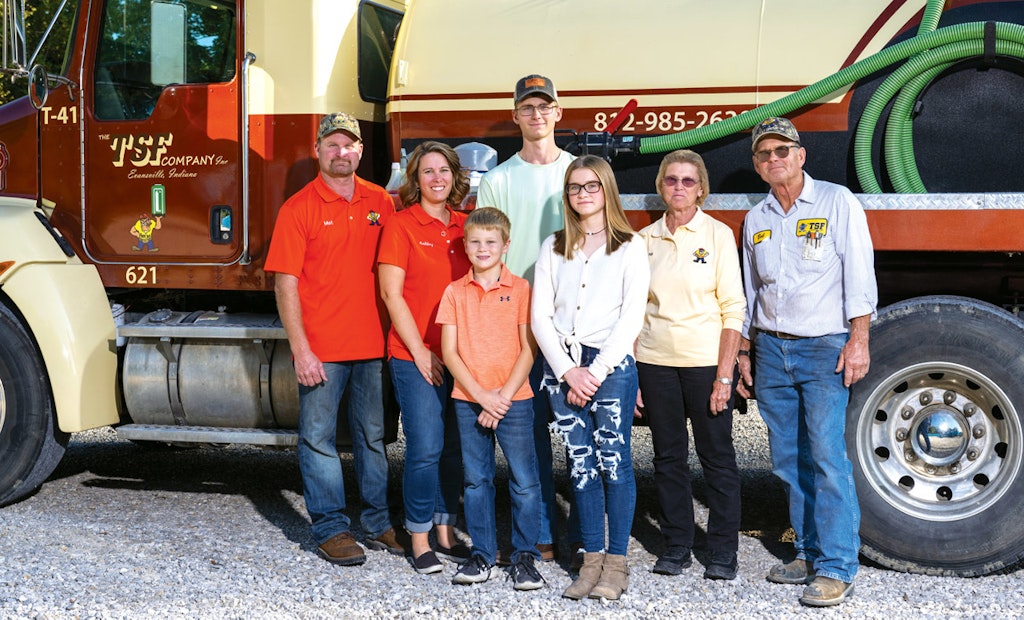
The T.S.F. team includes four generations of Schenks, from left, Mat, Ashley, Hunter, Fischer, Ella, Patty and Bob. (Photos by Marc Lebryk)
After more than six decades in business, the T.S.F. Company — now in its third generation of family ownership — has established itself as a portable sanitation fixture in rural Southwest Indiana. And Mat Schenk, the grandson of the company’s founder, is working to keep that legacy alive for decades to come.
“I was born into the business,” says Schenk, 42, who co-owns the business with his mother and father, Patty and Bob Schenk. “I started working here when I was about 10 years old … and I never left.
“I still enjoy it,” he adds. “It’s something different every day. You never know what’s going to happen.”
Schenk’s grandparents, Jeanetta, and the late Gene Barnhart, started the company in 1959. An industry pioneer, Gene Barnhart built and rented restrooms made out of plywood. That gradually evolved into a restroom-manufacturing business that today is known for its line of Tuff Jon restrooms.
As such, the business, located in Evansville, Indiana, is an outlier in the industry because it both builds restrooms and related items while also renting and servicing restrooms, as well as pumping out septic tanks.
DIVISION OF LABOR
Schenk handles the rental and service side of the business, while his wife, Ashley, handles restroom sales and routing for rental-restroom deliveries and service calls, he says. Schenk’s parents remain involved in the business, too; Bob still comes in daily while Patty serves as office manager.
“Dad turned 70 a little while ago and told me he’s going to start taking Wednesdays off,” Schenk says. “But he still hasn’t missed a Wednesday yet. He’d be bored if he ever stopped working.”
Interestingly, the company’s name refers to a product it hasn’t made for decades. T.S.F. stands for Tri-State Flasher, a reference to the road signs and traffic barricades with flashing warning lights that Barnhart used to make and rent, Schenk explains.
Restroom rentals generate about 75% of the service end of the business, with septic tank pumping contributing the remaining 25%. Construction restroom rentals produce about 75% of the restroom-rental volume with special events kicking in the balance.
NEVER SAY NO
What key factors have contributed to the company longevity? Schenk says it all boils down to providing strong customer service, some commonsense business savvy and the resourcefulness and strong work ethic of its founders and the generations that followed.
“Our business philosophy is simple: Never say no to customers,” Schenk says. “Instead, we just say, ‘Yup, we can do that.’ Then we hang up the phone and figure out how to actually do what the customer wants. You can never afford to let a business opportunity pass you by.”
The resourcefulness factor dates back to Gene Barnharts’ restroom-building days, which started when sign-and-barricade customers asked him if he’d build and rent out restrooms, too. Barnhart used 55-gallon drums as restroom tanks, Schenk says.
“He’d change out the barrels for customers,” he says. “He was a real entrepreneur.”
In the early 1990s, customers began asking the company to also provide septic-pumping services, and Barnhart obliged, reflecting the company’s never-say-no philosophy. He used an old restroom service truck to pump out tanks and soon was so busy he fabricated his own septic vacuum truck.
“It was a logical add-on service to restroom rentals,” Schenk observes. “It also allowed us to cross-market the restroom and septic services. There’s definitely value to offering more than one service. You don’t want all your eggs in one basket.”
MECHANICALLY INCLINED
The company’s can-do attitude is reflected in its fleet of restroom service trucks, fabricated by employees. Six of the trucks are built on International 4300 chassis and feature Masport pumps and self-fabricated tanks, using rolled steel shells and tank ends manufactured by Kennedy Tank and Mfg. The tanks can carry up to 380 gallons of freshwater and 1,000 gallons of waste.
The company also owns three more used restroom service trucks built on Kenworth T270 chassis, Masport pumps and 1,100-gallon waste/400-gallon freshwater steel tanks made by Abernethy Welding & Repair.
In addition, the company recently outfitted a Kenworth T270 and an International 4300 for restroom service, using rolled steel shells and tank ends made by LMT and pumps built by Masport. The tanks can carry up to 400 gallons of freshwater and 1,100 gallons of waste.
To deliver and pick up an inventory of about 3,000 Tuff-Jon restrooms, employees use an International 4700, a Ford F-350 and a Ford F-450; each carrying up to six restrooms.
The company also owns handicapped restrooms from Satellite Industries and two restroom trailers, one self-fabricated and one built by Ameri-Can Engineering.
To pump septic tanks, TSF relies on an International 4700, a Kenworth T600, a Ford LN8000 and a Ford Aeromax. Three of the trucks are equipped with self-fabricated steel cylinders and tank ends made by Kennedy Tank (3,500-, 2,500- and 2,000-gallon capacities) and one steel tank made by LMT (3,500 gallons). All the trucks have Masport pumps.
The company also owns to two stainless steel tanker trailers, one 5,000-gallon unit made by Walker Transport (a brand owned by Wabash National) and the other built by Tremcar that holds 6,500 gallons.
They’re used to transport waste from the T.S.F. yard to a local treatment plant, Schenk says.
CLEAN SERVICE
While the company doesn’t do anything unusual to market its services, Schenk says servicing customers with clean, nicely lettered trucks and thoroughly cleaning restrooms goes a long way toward generating word-of-mouth referrals, the most effective form of advertising.
“All you have to do is do what customers pay you to do — take a little pride in everything you do,” he says of the company’s no-nonsense take on customer service. “We tell our route drivers that when they pull into a customer’s driveway, they’re representing themselves … the customers usually don’t know me, my dad or the history of the company.
“But everything they do reflects on the company, so going the extra yard for customers is the most important thing they can do.”
That’s especially true since more and more companies seem to pop up lately and try to gain market share by low-balling prices. While T.S.F. may periodically lose customers to this tactic, most tend to come back eventually when they realize they get what they pay for, Schenk says.
“As long as we provide quality service and go the extra mile for customers, it works out in the long run,” he says. “You have to play the long game in all of this.”
MAINTAINING A LEGACY
As the years go by, Schenk says he feels more pressure to ensure the family-owned company remains successful. He knows full well that according to federal government statistics, the third generation of ownership generally doesn’t fare very well. In fact, statistics show about 70% of businesses fail to last longer than 10 years.
“Our lawyer always reminds us that it’s the third generation that usually messes things up,” he says. As such, Schenk is focused on keeping the company sustainable, while maintaining its family culture that makes it a great place to work and, for family members, a home away from home.
“Ashley and I live a block away from the shop,” Schenk says. “My mom and dad live a block and a half away and my grandma lives a half-block away. So everyone is just right here … we’ve lived this way for so long that we’re accustomed to having all that family around all the time.”
SUCCESSION PLANNING
Schenk is the only one of a dozen or so grandchildren who works for the company. But he’s not at all resentful about that.
“I’m really glad I stayed around to carry on the family business,” he says. “It’s all I’ve ever known.”
Looking ahead, Schenk is hopeful some of his children eventually take over the business. His 18-year-old son, Hunter, has been working full time for T.S.F. since graduating from high school in 2021, but has been helping out part-time since he was about 9 years old. His 10-year-old son Fischer, rides with Schenk almost every day and helps out in the shop, too.
Schenk’s 13-year-old daughter, Ella, hasn’t expressed much interest in the family business, but he notes that could change, too.
“I’d love nothing more than for a fourth generation to come in and say, ‘Dad, you’re no longer needed,’” he says. “Then I could just fade away. But I’d probably keep hanging around the place, just like my dad does. I’d do it just to aggravate them.”
